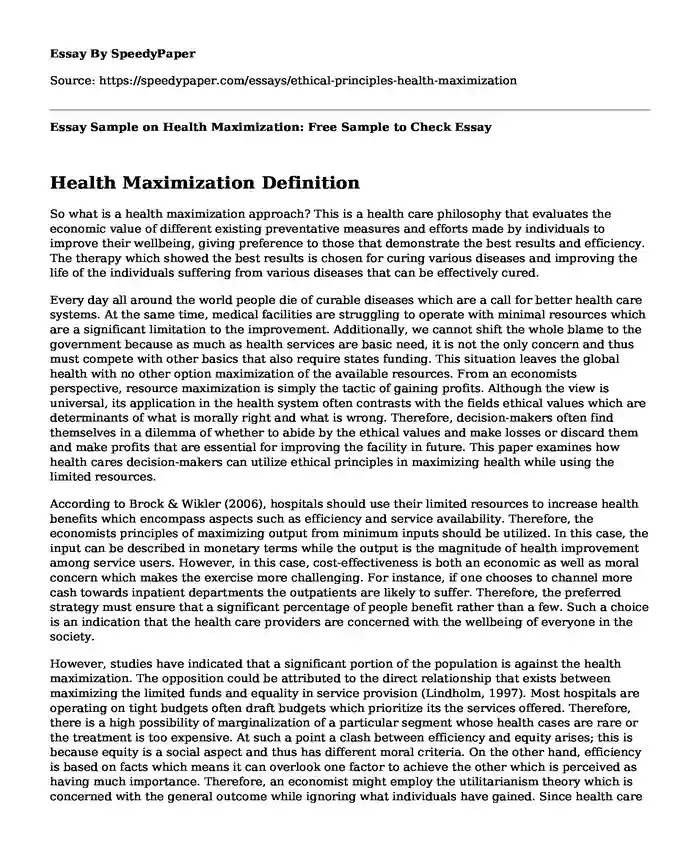
| Type of paper: | Essay |
| Categories: | Healthcare |
| Pages: | 3 |
| Wordcount: | 742 words |
Health Maximization Definition
So what is a health maximization approach? This is a health care philosophy that evaluates the economic value of different existing preventative measures and efforts made by individuals to improve their wellbeing, giving preference to those that demonstrate the best results and efficiency. The therapy which showed the best results is chosen for curing various diseases and improving the life of the individuals suffering from various diseases that can be effectively cured.
Every day all around the world people die of curable diseases which are a call for better health care systems. At the same time, medical facilities are struggling to operate with minimal resources which are a significant limitation to the improvement. Additionally, we cannot shift the whole blame to the government because as much as health services are basic need, it is not the only concern and thus must compete with other basics that also require states funding. This situation leaves the global health with no other option maximization of the available resources. From an economists perspective, resource maximization is simply the tactic of gaining profits. Although the view is universal, its application in the health system often contrasts with the fields ethical values which are determinants of what is morally right and what is wrong. Therefore, decision-makers often find themselves in a dilemma of whether to abide by the ethical values and make losses or discard them and make profits that are essential for improving the facility in future. This paper examines how health cares decision-makers can utilize ethical principles in maximizing health while using the limited resources.
According to Brock & Wikler (2006), hospitals should use their limited resources to increase health benefits which encompass aspects such as efficiency and service availability. Therefore, the economists principles of maximizing output from minimum inputs should be utilized. In this case, the input can be described in monetary terms while the output is the magnitude of health improvement among service users. However, in this case, cost-effectiveness is both an economic as well as moral concern which makes the exercise more challenging. For instance, if one chooses to channel more cash towards inpatient departments the outpatients are likely to suffer. Therefore, the preferred strategy must ensure that a significant percentage of people benefit rather than a few. Such a choice is an indication that the health care providers are concerned with the wellbeing of everyone in the society.
However, studies have indicated that a significant portion of the population is against the health maximization. The opposition could be attributed to the direct relationship that exists between maximizing the limited funds and equality in service provision (Lindholm, 1997). Most hospitals are operating on tight budgets often draft budgets which prioritize its the services offered. Therefore, there is a high possibility of marginalization of a particular segment whose health cases are rare or the treatment is too expensive. At such a point a clash between efficiency and equity arises; this is because equity is a social aspect and thus has different moral criteria. On the other hand, efficiency is based on facts which means it can overlook one factor to achieve the other which is perceived as having much importance. Therefore, an economist might employ the utilitarianism theory which is concerned with the general outcome while ignoring what individuals have gained. Since health care operates under the principle of striving to satisfy needs at an individual level, any choice must be inclusive of the needs of everyone.
Making economic decisions concerning the health care facilities can be a great challenge given the contrasting ideologies. Such decisions often require inputs from two different field i.e. economics and the medical field. The former is governed by clear rules that determine whether one will suffer loss or win, on the contrary, the medical field seems to have multiple requirements which often limits ones freedom of choices. Regardless of the constraint that morality has on economic making, medics must be realistic because it is impossible to attain the same achievement as any other business organization within the same time frame. Instead, hospitals must realize that their growth would be slow at any given moment.
References
Brock, D. & Wikler, D. (2006). Ethical Issues in Resource Allocation, Research, and New Product Development. World Bank. Retrieved from http://www.ncbi.nlm.nih.gov/books/NBK11739/
Lindholm, L. (1997). Health maximization rejected. The view of Swedish politicians. The European Journal Of Public Health, 7(4), 405-410. http://dx.doi.org/10.1093/eurpub/7.4.405
Cite this page
Essay Sample on Health Maximization: Free Sample to Check. (2019, Sep 30). Retrieved from https://speedypaper.net/essays/ethical-principles-health-maximization
Request Removal
If you are the original author of this essay and no longer wish to have it published on the SpeedyPaper website, please click below to request its removal:
- An Essay Sample on Clarifying Content Priorities
- Third Grade African American Boys Respond to Representations of Race, Class, and Gender in Children's Literature
- Free Essay Sample on Water Carriers and Pipelines
- Free Essay: The Long-Term Distrust Between Russia and the United States from the Last 100 Years
- Guidelines for Field Triage of Injured Patients - Free Essay in Medicine
- African Music and Culture, Essay Example
- Paper Example on Comparing Impact of Laws on Tesco Plc's Customer Service
Popular categories




